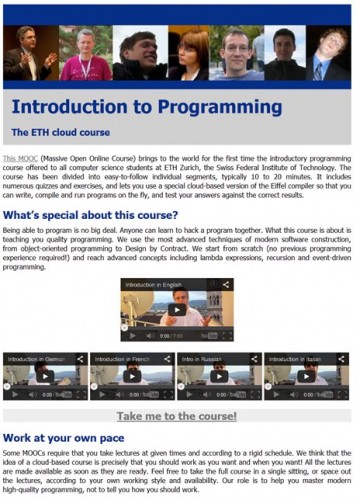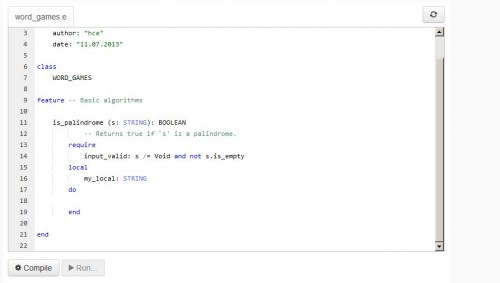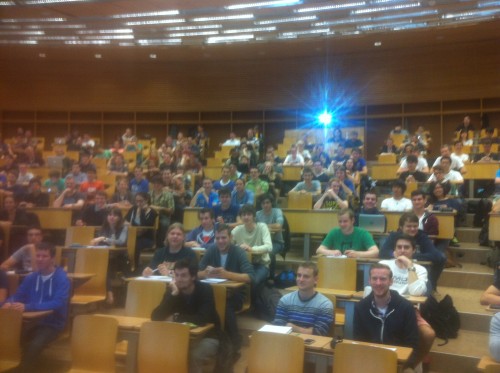 The ETH introductory programming course, which I have taught since 2003 and used as the basis for the Springer Touch of Class textbook, is now available as a MOOC: an online course, open to anyone interested [1]. The project was started and led by Marco Piccioni.
The ETH introductory programming course, which I have taught since 2003 and used as the basis for the Springer Touch of Class textbook, is now available as a MOOC: an online course, open to anyone interested [1]. The project was started and led by Marco Piccioni.
The MOOC was released in September; although it was “open” (the other “O”) from the start, we have not publicized it widely until now, since we used it first for the benefit of students taking the course at ETH, and took advantage of this experience to polish it. If you follow the acronym buzz you may say it was first a “SPOC” (Small Personal Online Course”). The experience with our students has been extremely encouraging: they took it as a supplement to the lectures and widely praised its value.We hope that many others will find it useful as well.
MOOCs are hot but they have attracted as much criticism as hype. We have seen the objections: low completion rates, lack of direct human contact, threats to traditional higher education. Two things are clear, though: MOOCs are more than a passing fad; and they have their own pedagogical advantages.
MOOCs are here to stay; one ignores them at one’s own peril. For courses on a popular topic, I believe that in a few years almost everyone will be teaching from a MOOC. Not in the sense of telling students “just follow this course on the Web and come back for the exam“, but as a basis for individual institutions’ courses. For example the students might be told to take the lessons online, then come to in-person lectures (“Flip The Classroom“) or discussion sessions. For any given topic, such as introduction to programming, only a handful of MOOCs will emerge in this role. We would like the ETH course to be one of them.
The question is not just to replace courses and textbooks with an electronic version. MOOCs enrich the learning experience. Introduction to Programming is a particularly fertile application area for taking advantage of technology: the presentation of programming methods and techniques becomes even more effective if students can immediately try out the ideas, compile the result, run it, and see the results on predefined tests. Our course offers many such interactive exercises, thanks to the E4Mooc (Eiffel for MOOCs) framework developed by Christian Estler [2]. This feature has proved to be a key attraction of the course for ETH students. Here for example is an exercise asking you to write a function that determines whether a string is a palindrome (reads identically in both directions):

The program area is pre-filled with a class skeleton where all that remains for you to enter is the algorithm for the relevant function. Then you can click “Compile” and, if there are no compilation errors, “Run” to test your candidate code against a set of predefined test values. One of the benefits for users taking the course is that there is no software to install: everything runs in the cloud, accessible from the browser. Here we see the MOOC not just as a technique for presenting standard material but as an innovative learning tool, opening up pedagogical techniques that were not previously possible.
Besides E4Mooc, our course relies on the Moodle learning platform. Our experience with Moodle has been pleasant; we noticed, for example, that students really liked the Moodle feature enabling them to gain virtual “badges” for good answers, to the point of repeating exercises until they got the badges. For instructors preparing the course, building a MOOC is a huge amount of work (that was not a surprise, people had told us); but it is worth the effort.
We noted that attendance at the lectures increased as compared to previous years. The matter is a natural concern: other than the cold November mornings in Zurich (one of the lectures is at 8 AM) there are many reasons not to show up in class: the textbook covers much of the material; all the slides are online; so are the slides for exercise sessions (tutorials) and texts of exercises and some earlier exams; lectures were video-recorded in previous years, and students can access the old recordings. Our feeling is that the MOOC makes the course more exciting and gives students want to come to class and hear more.
The MOOC course is not tied to a particular period; you can take it whenever you like. (The current practice of offering MOOCs at fixed times is disappointing: what is the point of putting a course online if participants are forced to fit to a fixed schedule?)
Marco Piccioni and I are now off to our second MOOC, which will be a generalization of the first, covering the basics not just of programming but of computer science and IT overall, and will be available on one of the major MOOC platforms. We will continue to develop the existing MOOC, which directly supports our in-person course, and which we hope will be of use to many other people.
Take the MOOC, or tell a beginner near you to take it, and tell us what you think.
References
[1] Bertrand Meyer, Marco Piccioni and other members of the ETH Chair of Software Engineering: ETH Introduction to Programming MOOC, available here.
[2] H-Christian Estler, E4Mooc demo, available on YouTube: here.
VN:F [1.9.10_1130]
Rating: 9.4/10 (14 votes cast)
VN:F [1.9.10_1130]
Rating: +7 (from 9 votes)



 Informatics Europe
Informatics Europe LASER summer school
LASER summer school Propulsion Academy
Propulsion Academy